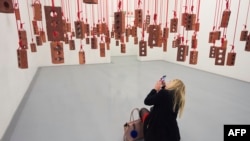The Zeitz Museum of Contemporary Art Africa officially opened its doors on Friday.
The new museum itself is a work of art. It is a century old grain silo on the historic waterfront in Cape Town, South Africa.
British architect Thomas Heatherwick redesigned the building for the African continent’s largest collection of contemporary art. All the art works were made after the year 2000.
The nine floor museum attempts to show that often ignored African contemporary art is worthy of attention. Museum officials hope to create excitement with its many exhibits.
Some works are inventive, while others suggest a clash of ideas. Some seem to be playful, while others leave visitors wondering what they saw.
Mark Coetzee works at the museum. He says it has several goals. One is to represent the people of Africa whose stories have often been told by other people, by outsiders.
“Let’s create an institution where people from Africa, whether we were born here thousands of years ago or whether we immigrated yesterday, can contribute to the writing of our history,” he told VOA. “Let us also define how we want to be presented to the world.”
Coetzee says contemporary art gives rise to many pressing issues in the modern world. He adds that modern art museums give people the tools to negotiate the times we are living in.
Artists, he says, ask very difficult questions, such as ‘Why is there separation of wealth and power?’ and ‘How do we negotiate difference in society when we have different religious, or different genders, or different orientations?’
Coetzee says a museum is “a very safe space to discuss very difficult issues,” which affect people in the 21st century.”
The new museum holds the private art collection of Jochen Zeitz, a German collector and former head of sportswear manufacturer Puma.
On entering the museum, visitors see a large dragon with a 100 meter long tail. The creature is made of bicycle inner tubes. It is the work of South African artist Nicholas Hlobo. Visitors can also see the bright photographs of zebras, balloons and human-like figures in costumes. Those images are from South African artist Athi-Patra Ruga.
Visitors can also see the nine screen video exhibit “Ten Thousand Waves” by British artist Isaac Julien. They can touch – and take home – prints of images by Angolan photographer Edson Chagas. They can walk through room after room of creatures made from cow skin by Nandipha Mntambo of Swaziland.
When the museum offered 24,000 free passes for two hour visits during its opening weekend, they were all given away in just 9 minutes.
In the last few years, African contemporary art has started to be respected. That is the opinion of Hannah O’Leary, head of modern and contemporary African art for Sotheby’s auction house. She admits that the market is new, and African artists often do not earn high prices. But Sotheby’s first auction of African art this year brought in $3.8 million. The event broke the record for the highest sales of African art at a single event.
While South Africa has always had a strong tradition in the arts, O’Leary says, other countries are becoming more interested in making art and buying it.
“From the results of our first sale, we have buyers from 29 different countries, on six different continents,” she told VOA from London. “We’re not talking about just selling South African art to South African buyers. We are taking the greatest art from across the continent and we know that that has the greatest appeal, so we are selling to collectors in Africa, but also in North America and Europe.”
Mark Coetzee says visitors should not be concerned about the museum’s $38 million design, its millions of dollars of art, or its elegant appearance. Nor, he said, should they all pay $13 for a single, one day admission. Children enter for free, and citizens of African nations get free admission every Wednesday.
I’m Susan Shand.
VOA’s Anita Powell reported this story from South Africa. Susan Shand adapted her report for Learning English. George Grow was the editor.
Write to us in the Comments Section or on our Facebook page.
__________________________________________________________
Words in This Story
museum – n. a building in which interesting and valuable things (such as paintings and sculptures or scientific or historical objects) are collected and shown to the public
silo – n. a tower that is used to store food (such as grain or grass) for farm animals
architect – n. a person who designs buildings
contemporary – adj. happening or beginning now or in recent times
exhibit – n. a collection of object that have been put in one place for people to see or inspect
institution – n. an organization
contribute – v. to supply or provide
balloon – n. a thin usually rubber bag that becomes larger when it is filled with air or gas
costume – n. the clothes that are worn by someone (such as an actor) who is trying to look like a different person or thing
gender – n. the behavioral or cultural qualities normally linked to one sex
auction – n. a public sale where things are gold to the person who offers to pay the most
elegant – adj. high grade or quality





